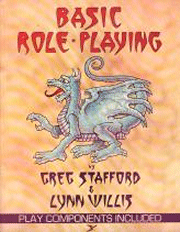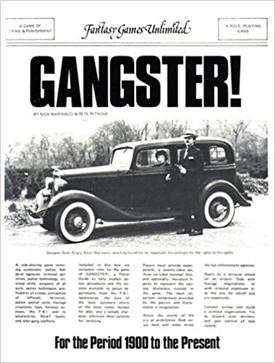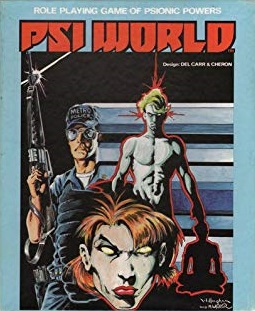
Barony, subtitled "Fantasy Role-Play", is a role-playing game published by Better Games in 1990.

Barony, subtitled "Fantasy Role-Play", is a role-playing game published by Better Games in 1990.
Barony is a fantasy role-playing game outlined in three books:
The game also includes a cut-apart tarot deck printed on three letter-sized pieces of cardstock, and a gamemaster's screen printed on paper, which reviewers noted was too flimsy to stand up on its own. [1]
Characters gain a new level or stage for each adventure completed successfully, and choose advancement in any one of the four beginning professions. If a player chooses to advance the character along the same profession path, the character can reach the highest possible level after as few as eight adventures. Moving a character from profession to profession will slow the rate of advancement down. [1]
Skills have four categories: Gifted; Learned; Practiced and Patient; and Physical and Combat. For a character to complete a task, the referee assigns a Difficulty to the task (Simple, Difficult, or Tasking), and the player rolls two eight-sided dice to determine success. [1]
There are no exact weapons in this game, only the character's combat skill. There are no hit points — both characters and their opponents have a list of adjectives describing their health, divided into four columns corresponding to the severity of the wound received (Bruise/Cut; Bleeder; Vicious; and Spirit). The tougher the character or opponent, the more adjectives are contained in each list. Each time a creature takes damage, one of the adjectives is marked off. When the last adjective has been removed, the creature is dead. There is also a completely separate combat system for battling dragons. [1]
Rather than casting a pre-printed spell, the player simply tells the referee what effect is desired, and which of six "laws of nature" is being broken. The referee judges if the request is reasonable, and decides to what degree the laws of nature are being broken. The player then makes a skill roll for each law being broken, the difficulty being dependent on the degree to which the law is being broken. If the player is not very successful, the character will either have to pay a cost in Magic Points, or if the character has no Magic Points, the player rolls dice to determine a Major Mishap that will inflict the character. [1]
In the early 1980s, the RPG game market was dominated by games with complex rules such as Dungeons & Dragons (TSR) and RuneQuest (Chaosium). But in the late 1980s, small independent game designers started to create games that were less about rolling dice and more centered on the story narrative. [2] Two such designers were Joseph Hillmer and George Rahm, who created two "rules light" role-playing games: the science fiction RPG Era Ten and the fantasy RPG Barony. Both implemented a much simplified rules system that used tables and a deck of cards to resolve all action in the game. Barony, featuring the artwork of Todd Pickens, was published by Better Games of Burbank, California in 1990. [3] Better Games also produced several supplements for Barony', which were published on their website and in the pages of Space Gamer/Fantasy Gamer . [4]
Stewart Wieck, reviewing both of Better Games' RPGs, Barony and Era Ten, in White Wolf #26 (April/May, 1991), liked the rules system, calling it "an outline that relies little on actual rules, and more on gamemaster initiative." But Wieck was not impressed by the poor editing, noting "the choppy writing (innumerable sentence fragments) makes the text tiresome to follow." Wieck was also distressed by the lack of organization of the rules. Nonetheless, Wieck concluded by giving Barony a rating of 4 out of 5, saying, "Better Games works under the tagline that you've been gamemastering long enough to know what you want and how you want to run your game. The systems presented in Barony and Era Ten will allow you to do this if you have the stamina to survive the rules writing and the wits to use the ideas." [3]
In the March 1992 edition of Dragon (Issue #179), Lester Smith Smith found the game "amazing in its inventiveness." He liked the outward appearance of the packaged game but found the titles of the three books too ambiguous, with lack of clarity as to which one he should read first. Smith found a certain "lack of polish" in the product, with small, dense text with no chapter headings, and a writing style that "ranges from mildly difficult to nigh impossible to read in places, and evinces a near complete lack of awareness of the simplest technical writing tricks to make text easy to comprehend. The thing that bothers me most about this is that the creative ideas included in the game deserve better presentation." Despite these problems, Smith believed that "The Barony game should be part of every serious role-player’s library. The magic system, dragon battle system, mission generator, and encounter generator can be adapted very easily to any other fantasy role-playing game, and that FRPG will be the richer for it ... Despite my complaints about the game’s presentation, I highly recommend the Barony game. [1]
In his 2014 book Designers & Dragons: The '80s, game historian Shannon Appelcline noted that Barony and Era Ten were part of a movement of "'free style roleplay' games" in the early 1990s, "early 'indie' efforts that tried to break free of the old clichés of RPGs and instead offer more story-oriented games." [5] : 36

Basic Role-Playing (BRP) is a tabletop role-playing game which originated in the RuneQuest fantasy role-playing game. Chaosium released the BRP standalone booklet in 1980 in the boxed set release of the second edition of RuneQuest. Greg Stafford and Lynn Willis are credited as the authors. Chaosium used the percentile skill-based system as the basis for most of their games, including Call of Cthulhu, Stormbringer, and Elfquest.

d20 Modern is a modern fantasy role-playing game system designed by Bill Slavicsek, Jeff Grubb, Rich Redman, and Charles Ryan. The system's core rulebook was published by Wizards of the Coast on November 1, 2002; by 2006, ten additional supplements were released. The game is based on the d20 System and the Dungeons & Dragons 3rd Edition ruleset. It includes various campaign settings along with the tools to build campaigns in modern/contemporary settings.

Role-playing games (RPGs) have developed specialized terminology. This includes both terminology used within RPGs to describe in-game concepts and terminology used to describe RPGs. Role-playing games also have specialized slang and jargon associated with them.

Character creation is the process of defining a player character in a role-playing game. The result of character creation is a direct characterization that is recorded on a character sheet. This may include a representation of the character's physical, mental, psychological, and social attributes and skills in terms of the specific game's mechanics. It may also include informal descriptions of the character's physical appearance, personality, personal back-story ("background"), and possessions. Games with a fantasy setting may include traits such as race, class, or species. Character creation is the first step taken by the players in preparation for a game.

Living Steel is a high-tech science fiction role-playing game published by Leading Edge Games in 1987.

Cyborg Commando is a post-apocalyptic role-playing game (RPG) published by New Infinities Productions, Inc. (NIPI) in 1987. The designers were well-known in the role-playing game market — Gary Gygax, Frank Mentzer and Kim Mohan, but despite this name recognition, the game was a commercial failure.

Starfaring was the first science fiction role-playing game (RPG) published, released by Flying Buffalo in August 1976. Although it was the first to market, it didn't attract an audience, and was soon superseded by the much more popular Traveller published the following year.

Powers & Perils (P&P) is a fantasy role-playing game published by Avalon Hill in 1984. The highly complex game was Avalon Hill's first foray into the role-playing game market, and proved to be a commercial failure.

Daredevils is a tabletop role-playing game published by Fantasy Games Unlimited (FGU) in 1982 that is meant to emulate pulp magazine fiction of the 1930s.

Gangster! is a role-playing game published by Fantasy Games Unlimited (FGU) in 1979 that is set in the 1920s in Chicago during the American Prohibition..

Psi World is a science fiction role-playing game published by Fantasy Games Unlimited (FGU) in 1984 that takes place in a near-future society in which certain individuals have psionic powers.

Bubblegum Crisis is a near-future cyberpunk role-playing game published by R. Talsorian Games in 1996 that is based on the anime television series Bubblegum Crisis.

Hong Kong Action Theatre! is a martial arts role-playing game published by Event Horizon Productions in 1996. A revised edition was published by Guardians of Order in 2001.

Fifth Cycle is a fantasy role-playing game published by Shield Games in 1990.

Marvel Super Heroes: The Heroic Role-Playing Game is a role-playing game boxed set published by TSR in 1984 for the Marvel Super Heroes role-playing game, and was the debut product for the game.
Advanced Phantasm Adventures is a fantasy role-playing game published by T.C. International in 1992.

Fantasy Earth: Basic Rules is a role-playing game published in 1994 by Zody Games.

Legendary Lives Player's Primer is the first of two books published by Marquee Press in 1990 required for the role-playing game Legendary Lives.

Legendary Lives Referee's Rulebook is one of the two books published by Marquee Press in 1990 required for the role-playing game Legendary Lives.

Era Ten, subtitled "Sci Fi Role-Play", is a science fiction role-playing game (RPG) published by Better Games in 1990.
{{cite magazine}}: CS1 maint: date format (link)